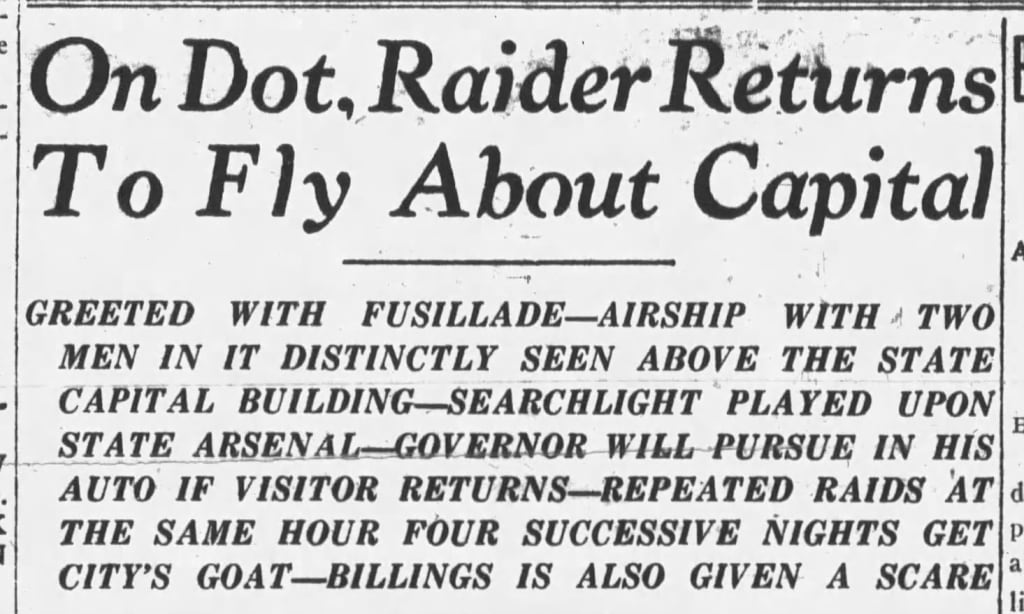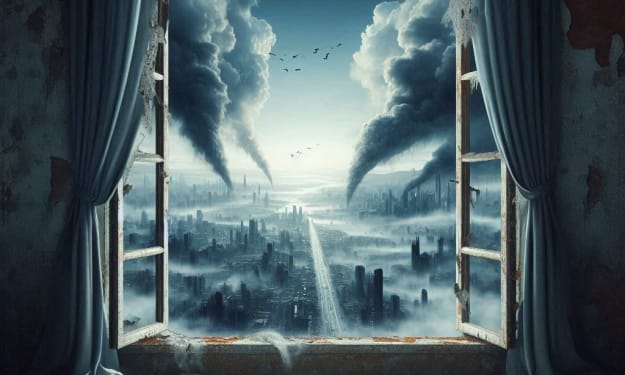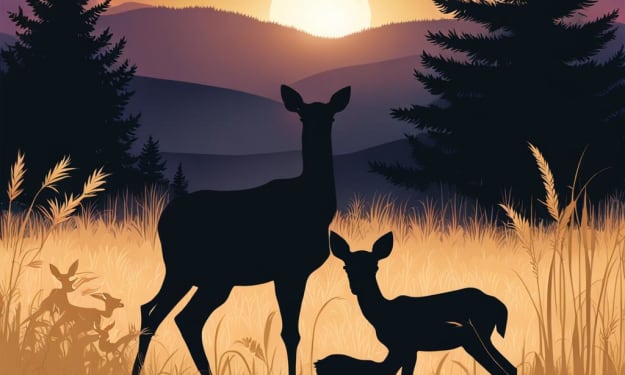The beginning and the end
The beginning and the end

They never found it.
They looked, but they never found it.
But they knew about it. The newspapers reported it. That’s why they looked for it. “Aircraft Pay Nightly Call,” said the Montana Record-Herald (September 10, 1917) about flights over Helena. The Western News in Hamilton (September 13, 1917) reported, “Helena Excited about Airplanes: All Kinds of Reputable Citizens Confirm Reports of Night Prowlers.”
Who saw one or more planes above Mt. Helena, over the city of Helena, or near the city? The newspapers of the time provided the details.
• G.W. Maurer, president of the Judson Mining Company, and his wife were first two witnesses. They saw a big plane one night on their way home from a card party.
• Al Galen, the attorney general, saw a big triplane that almost hit the towers of St. Charles College, and it dived at him! —almost knocking his hat off.
• Charlie Riefenrath, business manager of the Montana Record-Herald, verified Galen's report.
• Louis Thayer, telegraph editor of the Helena Independent, saw a plane after getting off work at 3 a.m.
• Brownie Burke, "a well known character" saw a monoplane almost hit the dome of the capitol building. He had been kept up late that night by indigestion.
• Maurice Weiss, proprietor of the Placer Hotel, saw a biplane about 3 a.m. one morning. He saw a bomb fall from the plane on the Hauser Lake Dam, but "On being questioned closely, Weiss stated that it might have been a bottle."
• Various residents pulled out their guns to shoot at the aircraft.
They knew that there were airplanes, mysterious airplanes flying around the government seat of Montana.
They even knew where to look. The Helena Independent (October 17, 1917) reported that German airships were seen repeatedly and "always going south," apparently, to a secret German spy base and wireless radio station west of Missoula.
Other newspapers pick up the story.
Finally, the Helena Independent (October 17, 1917) offered a hundred dollar reward for information about mysterious aircraft because questions needed answering: "Are the Germans about to Bomb the Capital City?" "Have they spies in the mountain fastnosses equipped with wireless station and aeroplanes? Do our enemies fly around over our high mountains where formerly only the shadow of the eagle swept?"
The German air base in Ravalli County was thus a matter of public record.
And they knew there were German spies in the state interfering with the western lumber camps and the mines of the Butte area. The newspapers had reported this too.
So they knew. And they looked for it. They looked for a secret German base in Ravalli County. They even got U.S. District Attorney Burton K. Wheeler (later U.S. Senator from Montana) to send a special agent to investigate.
No one found it.
After the war, dismal as wartime hysteria diminished the story. A savvy politician, Wheeler wrote in his autobiography, "Just how and why the German High Command expected to launch an invasion of the United States through western Montana, 6000 miles from Berlin, never made the slightest bit of sense to me, but the reports generated by this kind of emotion could not always be brushed aside.”
Despite the historical record, the story of the secret German base was brushed aside. No one found the base. And everyone stopped looking. In time it was essentially forgotten.
But it was still there —still in western Montana hidden by forests, hidden in the mountains, hidden by wilderness. And the defeat of Germany in the Great War and again in the Second World War did not stop the work at that secret base.
The German officer who established this base before the United States even entered the Great War is long dead. Buried with him in the mountains is a heart-shaped locket, evidence that someone once loved him.
In isolation, generations have continued the work at the base, repeatedly modifying the plan, adapting the tools, and corrupting the goal.
And thus, today, the world of people on Earth reaches its end. The post-apocalyptic dystopia will rot in literature read no more. This is the end.
###
About the Creator
Anne Millbrooke
Born in Oregon, raised on the coast of Washington, Anne went east to college — to Boise State in Idaho. Now living in Montana, she travels by camper van throughout the region.
Enjoyed the story? Support the Creator.
Subscribe for free to receive all their stories in your feed. You could also pledge your support or give them a one-off tip, letting them know you appreciate their work.






Comments
There are no comments for this story
Be the first to respond and start the conversation.